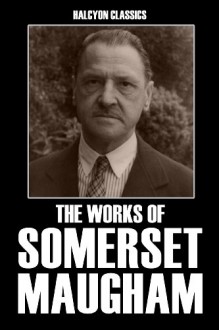
It has sometimes seemed to me that if the author can in no way keep himself out of his work it might be better if he put in as much of himself as possible.
- William Somerset Maugham.
Of Human Bondage was written in 1915 following a philosophical theme that William Somerset Maugham was developing during his first novel. It is Maugham's semi-autobiographical novel.
Philip Carey, born with a physically deformed foot, is orphaned at a very young age. He is raised in the house of his stoic, rigid, unyielding preacher uncle whom he grows to resent. As an intelligent and educated young adult, he is harshly disappointed by his unsuccessful attempt to become an artist. Floundering, he eventually settles on a medical career, where his compassion and capacity to ease his patients' suffering seem natural, inborn. He meets an ill mannered waitress, Mildred Rogers, and falls in love. They are, from the start, undeniably unsuited - completely incompatible to one another. Their obsessive and irrational, back and forth relationship is based on Maugham's developed philosophy of "human bondage" and the novel's central theme of love and passion.
Maugham postulated in his book (he refused to call it an autobiography or a book of recollections) The Summing Up:
"I believed we were wretched puppets at the mercy of a ruthless fate; and that, bound by the inexorable laws of nature, we were doomed to take part in the ceaseless struggle for existence with nothing to look forward to but inevitable defeat. I learnt that men were moved by egoism, that love was only the dirty trick nature played on us to achieve the continuation of the species, and I decided that, whatever aims men set themselves, they were deluded, for it was impossible for them to aim at anything but their own selfish pleasures." (The Summing Up, p.73)
Maugham's philosophy questioned the nature of human actions and their underlying motivations: If someone's choice of action is based on his rational will yet he is controlled by his very nature to follow a different action, then his rational will is not free. He is in psychological bondage.
The natural instincts of Maugham's characters are persistently scourged by unrelenting passion. Fanny Price, for example, the failed artist who needily attaches herself to Philip in Paris, is in a kind of bondage to the passion to paint. Her desire is deep rooted and overwhelming. Disregarding time and again her instructors' humiliating assessments of her lack of skill, she is driven to frantic levels and eventual self destruction.
Mildred is described as "anemic", a woman not even generically attractive, a consideration which makes Philip's infatuation of her the more odd. She is stupid and common - her passions are essentially primal; she's more easily drawn to men who are as manipulative and undependable as herself. For a caring, concerned, vulnerable and likable man like Philip, whom she describes often as a "real gentleman", she could barely tolerate. She is, to some degree, also in bondage to her own passions.
Philip's personal binds are obvious, beginning with his early comprehension of his physical restrictions - the origins of the barrier to his psychological freedom. Philip looses faith in the religion which proclaims freedom of prerogative; he realizes he hasn't the skill to follow his desire to paint; he obsessively loves Mildred in spite of her loathsome conduct and her inability to love him back; he suffers dire poverty when finding work is impeded by his club foot. Until Philip finds power over his constraining desires, his progression as the novel's protagonist remain stymied.
Maugham clearly made his point with Philip and Mildred's relationship, although too often, too repetitively. Philip seemed to fall into the same trap over and over again, without learning from his past bad experiences with this she-devil. Many times I shouted at him and wanted to shake him (gently, of course) from sheer exasperation.
Of Human Bondage is a wonderful read, be prepared to holler at Philip but don't miss out on the basic human lessons. Highly recommended.

 Log in with Facebook
Log in with Facebook 









